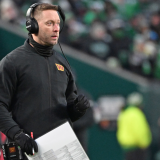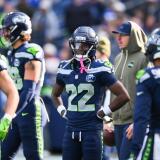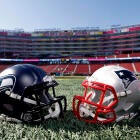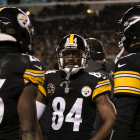Legal look: Saints bounty decision and what it means
Legal expert Eric Macramalla digs deep into Paul Tagliabue's legal decision to vacate all player punishment in the Bountygate case and explains what it really means for the league, the players and the possibility of further litigation.

Tagliabue hurts NFL case, rips coaches, may foster more suits

- Blog | RapidReports |
 Twitter | Newsletter
Twitter | Newsletter
The takeaway is a little more layered than that. It starts with this: if the NFL wants to punish players for bounties, it can't hand out really harsh sanctions that represent a dramatic departure from how bounties have been handled in the past. Typically, the NFL has fined teams for bounties and not suspended players. So Goodell's suspensions were deemed unreasonable because they were inconsistent with past league practice.
According to Tagliabue, it is an "undeniable fact" that bounties have been part of the NFL culture for decades. However, if the NFL wants to impose substantially tougher punishments on players, it is first "necessary to clarify the rules -- make sure everyone understands; postpone discipline for a while, not forever, but maybe for a season; and then enforce the rules with strict discipline."
Tagliabue cited a 2007 game between the Packers and the Patriots. There were allegations that players on both teams were offered money in exchange for targeting opposing players. Ultimately, the NFL fined both teams and said that the teams were responsible for their players.
For Tagliabue, the whole idea behind discipline is that it should inspire change, and punishments that represent a significant departure from past practice can become an impediment to change rather than an instrument for it. Punishments that are received as unduly harsh, arbitrary and inconsistent don't accomplish the stated goal of discipline. That was the problem Tagliabue had with Goodell's punishments.
The second takeaway: Certain players were unfairly singled out, while the evidence didn't warrant suspensions.
Fujita was completely exonerated.
Hargrove did obstruct the investigation by lying. However, Tagliabue said he was under tremendous pressure to do so from his coaches, who control his career. Tagliabue also noted that Hargrove's seven-game suspension for obstruction was "unprecedented and unwarranted" and that he could not "recall any suspension" for lying. By way of example, in December 2010, the NFL fined Brett Favre $50,000 -- but didn't suspend him -- for obstructing a sexual harassment investigation.
The former commissioner also declared that Hargrove was no more guilty than his defensive teammates, who also lied under oath but were not suspended.
As for Smith, he was singled out because he was a team leader on defense. However, Tagliabue said he was not aware of previous league discipline that "rested on whether or not a player was a team leader." Once again, Tagliabue felt that Smith was being singled out for selective prosecution.
Finally, and as outlined below, the evidence supporting Vilma's bounty offer on Brett Favre wasn't sufficiently clear to warrant a suspension.
The third takeaway: the Saints coaches and other senior officials (like general manager Mickey Loomis) shoulder a lot of the blame here. They "conceived, encouraged and directed" the bounty program. Players do what the coaches tell them to do.
I've stopped paying attention -- please summarize
Tagliabue's decision boils down to this: (1) bounties are a cultural reality in the NFL and it's not fair to punish players out of the blue without first educating them on what is and isn't allowed, (2) Goodell's punishments were too harsh since there was no precedent for the suspensions, (3) the evidence wasn't clear and certain players were unfairly singled out, and (4) the Saints coaches and management were chiefly to blame.
So Tagliabue found that the bounty program existed -- right?
Yes. Tagliabue agrees with Goodell that there was a bounty program in New Orleans. However, he disagreed that the players involved should be punished.
Can Goodell still suspend players for bounties in future?
Yes. First, though, the NFL may wish to takes steps to clarify and educate players on bounties and the resulting harsh punishments. A gradual transition period to stricter punishments may also help the NFL defend against future appeals.
Eric, why am I now asking you about non-guaranteed contracts?
Because it's an important part of this discussion.
NFL players don't have guaranteed contracts, which means they can be pretty much cut at any time for whatever reason if they aren't performing. While it may not seem fair, this condition of employment was collectively bargained by the league and players, and as a result, that's how things are for the players.
So a reasonable question to ask is this: To what extent do non-guaranteed contracts encourage NFL players to ignore their better judgment and participate in a bounty program?
It would seem that non-guaranteed contracts have an impact.
Let's start with the coaches. More than any other sport, players in the NFL fear their coaches. NFL coaches wield a lot of power and players understand that coaches have the power to hurt their careers, or worse, end them. So players are likely to do what they are told.
Now on to money. About half the NFL population makes about $500,000 or less, and the average playing career is somewhere around 3.5 years (depending on who you ask). Agreed -- some NFL players are very well paid, like Drew Brees, Peyton Manning and Aaron Rodgers. However, many players don't play long and don't make a lot of money, which can be a real incentive to follow the instructions of coaches.
Ultimately, in light of a player's finite earning potential, non-guaranteed contracts may make players more likely to ignore their better judgment and comply with orders to injure other players. At the very least, non-guaranteed contracts may create an environment where a player would seriously think about it.
Tagliabue agreed that non-guaranteed deals play a role in bounties when he wrote this:
"NFL players on average have short careers; their careers can end suddenly through injury or declining skills; players want to be good, cohesive members of the team, or unit, not complainers or dissenters; and players accept that they work for coaches, in "programs" conceived by coaches ... In such circumstances, players may not have much choice but to "go along," to comply with coaching demands or directions that they may question or resent. They may know -- or believe -- that from the coaches' perspective, 'it's my way or the highway.'"
Is Vilma's defamation case against Goodell stronger or weaker now?
Allegedly, Vilma got up in front of his teammates and offered to pay $10,000 to the player who would knock Favre out of the 2009 NFC Championship Game. Tagliabue didn't disagree that this happened. He also agreed that Goodell was reasonable in concluding that Vilma offered a bounty.
Vilma's denial of the bounty forms the basis of his defamation lawsuit against Goodell.
However -- and this is the important part -- Tagliabue said it wasn't clear if Vilma's offer was real or just rhetoric or trash talk. When Tagliabue addressed this point in his decision, he zeroed in on the tone of Vilma's alleged offer:
"Adding to the complexity, there is little evidence of the tone of any talk about a bounty before the Vikings game. Was any bounty pledged serious? Was it inspirational only? Was it typical 'trash talk' that occurs regularly before and during games? The parties presented no clear answers. No witness could confirm whether Vilma had any money in his hands as he spoke; no evidence was presented that $10,000 was available to him for purposes of paying a bounty or otherwise. There was no evidence that Vilma or anyone else paid any money to any player for any bounty-related hit on an opposing player in the Vikings game."
So Tagliabue didn't go so far as to make a finding that Vilma made a real offer. So that doesn't hurt Vilma's case. However, it doesn't really help it, either.
We don't have access to all the evidence or the transcripts from the hearing, so at this point it's not possible to assess the merits of Vilma's case with any certainty. However, according to Tagliabue's decision, in September 2012, Vilma said he didn't offer a bounty. But then at Tagliabue's hearing, he said he "might have." So that doesn't help Vilma's case, and it might hurt it given the inconsistent statements.
A jury will review all the evidence and make its own determination as to whether Goodell defamed Vilma. That is, unless this case settles. Vilma has indicated he is moving forward with the case. However, settlement remains possible.
Vilma's lawyer, Peter Ginsberg, is calling for the NFL to release the transcripts of the sworn testimony from Tagliabue's appeal hearing. It's possible that Ginsberg believes that the testimony may help his client. As well, Ginsberg may rely on the tone distinction raised by Tagliabue, arguing that even if an offer was made, it was never intended to be a serious one. Still, if an offer was made -- and it was reasonable to believe it was a real one -- Vilma might have some issues. However, I caution again, this all turns on the evidence.
So the Saints bounty case isn't over just yet. And its impact will be felt for years to come.
Eric Macramalla is a partner at a Canadian national law firm and also a sports legal analyst and sports lawyer. You can follow him on Twitter at @EricOnSportsLaw, and his sports law blog is located at www.OffsideSportsLaw.com.















